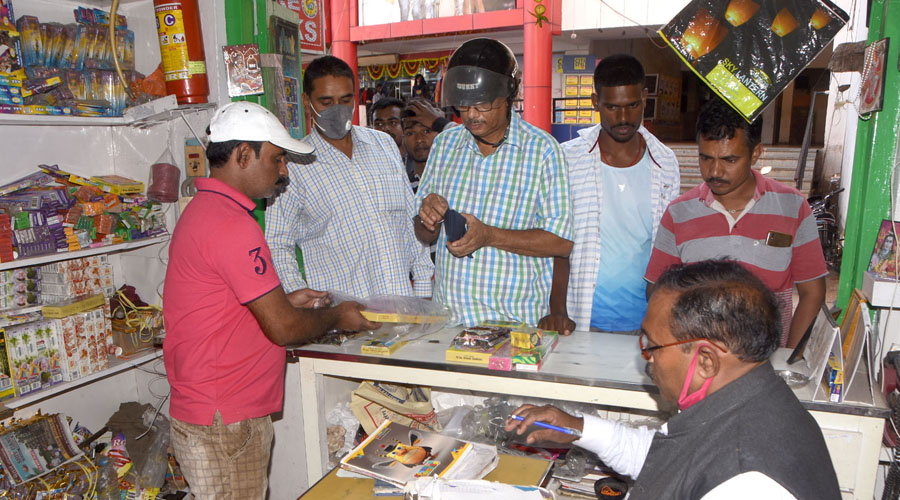The Jharkhand government imposed a ban on bursting firecrackers in public places this Diwali, citing the Covid-19 pandemic, but said that a separate set of guidelines for bursting firecrackers in private places would be issued in accordance with National Green Tribunal (NGT) guidelines.
The directive, issued by the Home, Prison & Disaster Management Department, comes close on the heels of an NGT order which prohibited bursting of firecrackers until November 30 in highly polluted cities, including Jharkhand’s Dhanbad.
The Jharkhand notification permitted Kali Puja in pandals and temples across the state but prohibited the entry of visitors.
“Kali Puja pandals shall be barricaded on all the sides in a way to prevent the entry of public. Only organisers up to a maximum strength of 15 are permitted inside the barricaded pandal,” the notification, signed by chief secretary Sukhdeo Singh, stated.
The government turned down the various Kali Puja committees’ demand to allow lighting and decoration at pandals. In the notification, it stated that there should be no decoration or lighting at and around the pandals. Besides, no welcome gates should be erected. Kali Puja committees had also sought permission for distributing bhog, but the government decided against it to curb the spread of the coronavirus.
However, the government allowed the use of public address systems at pandals for live broadcast of chanting of mantras only up to a limit of 55 decibel and not within a 100-meter radius of hospitals and courts. Puja committees will be allowed to play live chanting of mantras on loudspeakers from 7am to 9pm.
As per the government notification, puja committees have been prohibited from taking out processions during immersion of idols. Also, immersions have to be done at places approved by respective district administrations.
The ban on bursting firecrackers in public places comes at a time when Dhanbad, Sindri, Jamshedpur, Saraikela Kharsawan, Ranchi and Barajamda have been found to have higher air pollution levels than the upper limit set by the union Ministry of Environment, Forest and Climatic Change, as per a report by Greenpeace India. However, only Dhanbad was added in the National Clean Air Programme (NCAP) as a non-attainment city, the report stated.
Several states in India have banned crackers this Diwali citing the effect of air pollution on the health of Covid-19 patients. Rajasthan chief minister Ashok Gehlot was the first to announce a ban on sale and bursting of crackers on November 2. Later, on November 5, the Delhi government also imposed a ban on the sale and bursting of crackers after chief minister Arvind Kejriwal reviewed the Covid-19 situation in the national capital. A day later, the Karnataka government announced a complete ban on crackers this Diwali. Besides, the Calcutta High Court ordered a ban on sale and bursting of crackers across West Bengal owing to Covid-19 on November 5.
Jharkhand has reported fewer Covid-19 cases than the states like Delhi and Rajasthan. However, the Covid-19 caseload in Jharkhand is above 1 lakh and the number of active cases is down at 4,251, as per data with the health department.











